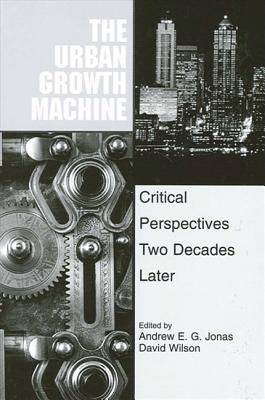
- Retrait gratuit dans votre magasin Club
- 7.000.000 titres dans notre catalogue
- Payer en toute sécurité
- Toujours un magasin près de chez vous
- Retrait gratuit dans votre magasin Club
- 7.000.0000 titres dans notre catalogue
- Payer en toute sécurité
- Toujours un magasin près de chez vous
The Urban Growth Machine
Critical Perspectives, Two Decades Later
Description
Two decades after Harvey Molotch's "city as a growth machine," this book offers a unique, critical assessment of his thesis.
Harvey Molotch's "city as a growth machine" thesis is one of the most influential approaches to the analysis of urban politics and local economic development in the United States. However, the nature and context of urban politics have changed considerably since the growth machine thesis was first proposed more than twenty years ago, and recent attempts to apply it to settings outside the U.S. have revealed conceptual and empirical limitations.
This book offers a unique critical assessment of the contribution of the growth machine thesis to research in urban political economy. Written from an interdisciplinary and international perspective, it brings together leading urban studies scholars. These contributors explore three organizing themes: urban growth, discourse and ideology; new dimensions of urban politics; and the growth machine in comparative perspective. These themes not only provide the focus for the critical examinations of the growth machine thesis, but also offer exciting new ways of thinking about and researching urban politics and local economic development.
As Harvey Molotch himself notes in this book's concluding chapter, "The growth machine idea makes a substantive argument about the empirical substance of U.S. urban regimes. It asserts that virtually every city (and state) government is a growth machine and long has been. It asserts that this puts localities in chronic competition with one another in ways that harm the vast majority of their citizens as well as their environments. It anticipates an ideological structure that naturalizes growth goals as a background assumption of civic life. In a social science realm where successful empirical generalizations have been few, the growth machine idea robustly and usefully describes reality."
Contributors include Thabit Abu-Rass, Keith Bassett, Mark Boyle, Allan Cochrane, Kevin R. Cox, Kyle Crowder, Melissa R. Gilbert, Bob Jessop, Andrew Kirby, Mickey Lauria, Helga Leitner, John R. Logan, Harvey Molotch, Jamie Peck, Stephanie Pincetl, Eric Sheppard, John Rennie Short, Adam Tickell, Rachel Bridges Whaley, and Andrew Wood.
Spécifications
Parties prenantes
- Editeur:
Contenu
- Nombre de pages :
- 312
- Langue:
- Anglais
- Collection :
Caractéristiques
- EAN:
- 9780791442593
- Date de parution :
- 12-08-99
- Format:
- Livre relié
- Format numérique:
- Genaaid
- Dimensions :
- 158 mm x 236 mm
- Poids :
- 544 g

Les avis
Nous publions uniquement les avis qui respectent les conditions requises. Consultez nos conditions pour les avis.





